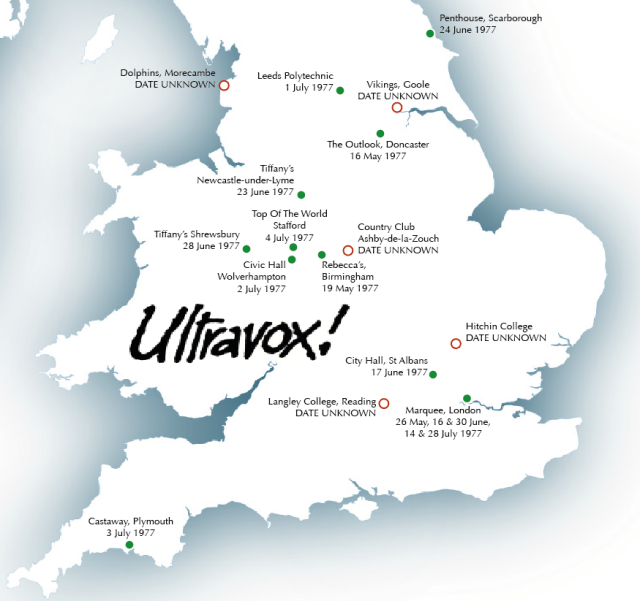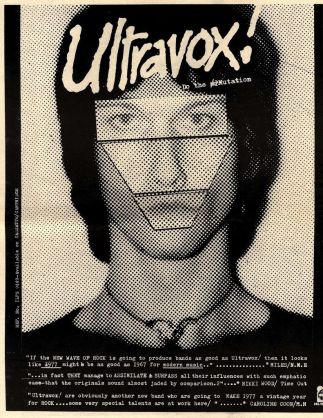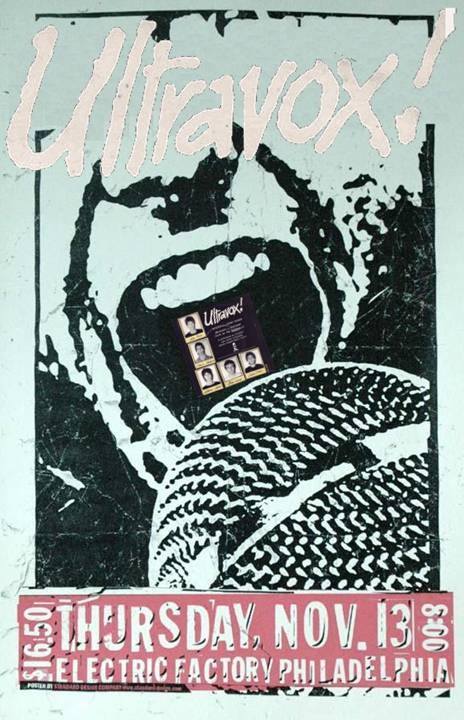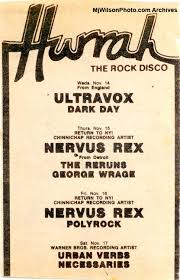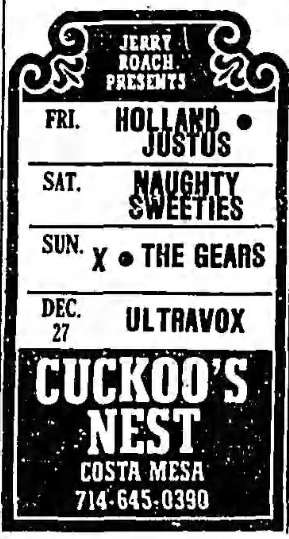Sounds, Germany (December 1978)
von Alfred Hilsberg
Ultravox soll eine Erfindung der Plattenfirme, eine synthetische Band sein. Das stimmt nicht, das muß irgendein fauler Journalist erfunden haben.
Nein, wir haben uns vor mehr als drei Jahren an der Kunstschule zusammmengefunden. Ich war, wie die anderen auch, genervt von der englischen Musizszene, weil sie sehr stark die amerikanische Musik imitiert hatte. Deshalb hatte ich Interesse, eigene Musik zu machen, einen eigenen Weg zu gehen. Es müßte so etwas wie europätische Musik geben.
Welche Gruppen waren deiner Meinung nach damals wichtig?
Vor allem Velvet Underground. Zum Beispiel haben sie lange vor den Who dieses Feedback eingesetzt. Ich habe auch damit herumexperimentiert, mit einer Gitarre, einfach so für mich…
Eure Bühnenschau ist stark visuell geprügt?
Ja, das kommt auch daher, daß ich Filme genauso wichtig finde wie Rockmusik Aber in der Welt des Kinos kenne ich mich nicht aus, deshalb habe ich mit anderen Dingen angefangen. Einmal habe ich mit Video gearbeitet. Wir haben Leuten ihr eigenes. Verhalten in einem Raum etwas zeitversetzt vorgeführt. Es ist sehr spannend, die Leute bei ihren Reaktionen zu beobachten. Wir haben Video bei seinen Eigenschaften genommen…
Sind eigentlich Texte wie der “Quiet Man” autobiografisch gemeint?
Manchmal schon.Mein Leben ist zum großen Teil öffentlich geworden. Und ich mag es, die Aufregung, die Hektik, vor allem auf einer Tournee. Aber andererseits liebe ich auch meine Privatheit, die Ruhe, das Schweigen. Aber ich brauche das Geld, das bei einer Tour hereinkommt. Also versuche ich, eine Art paralleles Leben aufzubauen, in das ich mich zurückziehen kann.
Solche Widersprüche sind wohl auch in anderen Texten. Die Worte scheinen nicht zueinander zu gehören. Wie “Systems Of Romance” zum Beispiel?
Das wirkt vielleicht auf den ersten Blick paradox. Manche Leute meinen Romantik sei etwas Natürliches. Aber schon wenn du einen Roman schreibst, wird Romantik systematisch aufgebaut, es ist ein ganzes System. Das hab eich auch auf dem Cover ausdrücken wollen, wo ich zur visuellen Beschreibung der Phrase Bilder z.B. aus Anzeigen verwendet habe. Zeichen, die dich täglich umgeben. Wie den modischen Anzug, den jemand trägt. Die Mode gehört auch zum System der Romantik. Ebenso die Stadt, in der du lebst. Und wie sich die Menschen darin einrichten. Und wie sie die Regenttropfen empfinden, die vor weißem Neonlicht niederfallen. Die Politik gehört auch dazu. Zum Beispiel die Lenin-Statue auf dem Roten Platz in Moskau. Aber bevor sich jemand mit Politik befaßt, sollte er sich darüber klar werden, was er von anderen Menschen überhaupt will. Welchen Einfluƒ er auf andere haben will. Das ist vor allem eine Frage des Image. Und dazu gehört ein Foto, sehr sauber, mit dem richtigen Gesichtsausdruck… Politik ist wie Pop-Musik.
Von der ihr auch ein bestandteil, seid…?
Sicher, ja, es wäre dumm. Es nicht zu sein. Es geht ja darum, die Mechanismen zu verstehen, wie dieses System funktioniert. Ich haben inzischen viele Einzelheiten davon mitbekommen, ich bin auf dem Weg, es zu verstehen. Das bringt mich weider ein Stück weiter. Das Image… Vermutlich was das Image von unerem ersfen Album sehr naiv, dieses Blitzlicht-Foto eines guten Fotografen. Ich mag die Musik immer noch, aber was hat sie mit dem Foto zu tun?
In euern drei Alben ist zunächst die Entwicklung festzustellern, daß ihr mehr und mehr elektroische Mittel einsetzt. Das erste Album hatte viel mehr traditionelle Rock-Elemente?
Wir haben mit der Zeit gelernt, was wir im Studio machen künnen. Im Unterschied zu manchen haben wir einen Synthesizer-Ton ent-deckt und diesen weiterentwickelt. Das erste Ergebuis war der auf der Schlagzeug-Grundlage entstandene Song “My Sex”, dann “Hiroshima Mon Amour”. Auch in “Quiet Man”, das ich vor der Producktion fertig hatte, haben wir eine Rhythmus-Maschine eingesetzt. Die hat schließlich das ganze Stück bestimmt.
Bei euern Aufritten habe ich den Eindruck, als warteten die meisten Zuhörer auf die gängigen Songs – vor allem Stücke, die das Gefühl ansprechen. Stellt ihr euch irgendwie darauf ein?
Wemm wir in erster :inie eine Pop-Band wären, würden wir erfolgreicher sein. Aber entscheidend ist: Ich möchte stolz sein auf das, was ich mache. Ich kenne die Erwartung an uns, daß wir headbanging-Rock machen sollen. Aber wir tun es nicht, obwohl wir den Rock mindestens ebenso gut spielen können wie andere Bands. Und wir haben bemerkt, daß viele, die zunäscht nur den Rhythmus von “Rock Wrok” gut fanden, sich intensiver mit dem Stück und mit anderen auseindersetzten.
Kommen die Punks vor allem zu euern Konzerten, weil du ein Image verkörperst, das des Mechanical Man?
Sicher mag das ein Grund für viele sein. Aber wir unterscheiden uns insgesamt von anderen Bands. Auf der einen Seite kommen Leute, die in erster Linie unsere Musik gut finden. Auf der anderen Seite soche, die sich mehr mit den Texten beschäftigen. Die Reaktionen der Punks kann ich gut verstehen. Ich war schließlich in meiner Gegend in Mittelengland selbst in einer Straengang. Für die Kids bedcuten Emerson oder Yes genauso wenig wie für mich.Und daß sie den Mut haben, einfach auf die Bühne zu gehen und selbst zu spielen, das ist gut. Auch wenn es am Anfang furchtbar klingt. Als die Who “My Generation” gemacht haben, konnten sie kaum spielen. Jetzt ust das Stück ein Klassiker. Eno spielt immer noch nicht gut. Aber er macht wundervolle Sachen. Vielleicht gerade deshalb (Lacht!)
Wie ihr kommen insbesinders viele New Wave-Gruppen aus den Industrie-Regionen der Insel nach London…?
Dafur gibt es einen haupt-sälchlichen Grund, abgesehen davon, daßes nicht neu ist Rock’n’Roll ist für viele Kids die einzige Müglichkeit, ausihren Verhältnissen rauszekommen. Früher wollte man Boxer oder Fußballer werden. Zwei meiner Freunde sind so Profi-Füßballer geworden. Ich komnnte nicht F¨ßball spielen. Also wurde ich Künstler.
SYSTEMS OF ROMANCE wurde in Deutschland im Studio von Conny Plank puduziert. Warum habt ihr euch dafür entschieden?
Schon sehr lange habe ich die Produktionen bewundert, die aus Deutschland kamen, wie Neu und Kraftwerk. Bei diesen Aufnahmen habe ich den Eindruck, daß die deutschen Rockmusiker zum erstenmal nicht die amerikanische Musik nachspielen, sondern eine eigene Identität finden. Wir trafen Conny Plank bel einem unserer Konzerte im “Marquee”, und er sagte “Vielleicht können wir mal zusammenarbeiten.” So fing es an. Und wir kamen nach Köln, als Eno mit Devo dort arbeitete. Es war faszinierend, die drel Tage. Und wir haben uns entschieden mit Conny das nächste Album zu produzieren. Er versteht, was wir wollen. Er hat uns gezeigt, wie er unsere Ideen umsetzen kann. Das ist das Geheimnis eines guten produzenten.
Hat sich diese neue Erfahrung Deutschland, die neue Umgebung, auf eure Absichten ausgewirkt?
Ja, denn das Album vorher, HA HA HA haben wir mitten in der Londoner City produziert, in der ganzen Hektik, in Räumen ohne Fenster. Während Conny’s Studio eine sehr schone Umgebung hat, Landschaft, auf die man sehen knn Davon ist zumindest “Quiet Men” beeinflußt… Wahrend unserer letzten Tournee durch Deutschland haben wir gemerkt, daß das Land viel stärker organisiert ist als England. Da lief auch die Fahndung wegen der Baader-Meinhof-Leute, wir haben die Spannung gespürt. Die Polizei war sehr aktiv… Hinter dieser gut organisierten Fassade ging etwas anderes vor sich…
Wie erklärst du dir, daß viele Musiker and Rock-Fans in England die deutsche Elektronik-Musik für “das Großte” halten, während es bei uns nicht so ist?
Es geschah schon oft in der Gerschichte, daß der Prophet im eigenen Lande nichts galt. Auch Velvet Underground waren in England beliebter also in den USA. Aber Erfolg, was heißt das… Wir sind zufrieden, wenn wir genug Erfolg haben, um unsere Dinge weitermachen zu können. Ohne immer dasselbe mchen zu müssen, wie z.B. viele Teenager-Bands. Da kann man dumm werden. Es gibt noch so viel Musik zu entdecken.
Wie kommst du damit klar, einerseits auf der Bühne zu agieren wie eine Art Superstar, andererseits aber mehr in einer Kult-Band sein zu wollen?
Interessanter finde ich es schon, in einer Kult-Band zu sein. Dann hat man ein Publikum, das sich benüht, einen zu verstehen. Das mit dem Superstar-Image sehe ich nicht so. Ich benutze zwar Verhaltensweisen, wie sie bekannt sind, abersolange ich mir dessen bewußt bin, werden sie nicht zu einer festen Einrichtung. Zu etwas Vermarktbarem, so wie das Image, ein Trinker oder ein Drogen-Typ oder ein sexuell seltsamer Star zu sein. Ich versuche zumindest, solchen Mechanismen der Vermarktung nicht zu unterliegen.
Warem trägst du diese Nicht-Farbe Schwarz?
Ich mag es, das ist alles… Mir ist eine interessante Sche eingefallen. Es würde großartig sein, überhaupt kein Image zu haben, kein Gesicht. Eine Platte zu machen, aus der einfach deine Stimme kommt. Jeder der sie hört, kann seine eigene Person dazu erfinden. Aber das ist ein seltsames Konzept, nachdem schon länger als 40 oder 50 Jahre das Gegenteil passiert.
Würdest du eure Musik als funktionelle Musik bezeichnen?
Das einzuordnen… Letzt lich hängt es immer davon ab, was die Leute erwarten. Manche ommen nur zu einem Konzert, um einem schönen Abend zu verbringen. Andere warten nach dem Konzert auf uns, um mit uns über die Texte usw, zu sprechen. Besonders in Deutschland gesscheiht das… Ich finde es genauso gut, daß die Leute einfach Musik zum Tanzen toll finden, den Sound… ja, den Disco-Sound, das ist doch unheimlich gut gemacht. Es ist sehr funktionelle Musik. Take it or leave i! Ich mag keine Prediger!
Eure Musik und deine künstlerischen Arbeiten, die Collagen und Zeichnungen, scheinen mir beeinflußt von Konstruktivismus, auch vom Futurismus?
Gewiß ja. Die Futuristen waren eigentlich die ersten, die in Geschwindingkeit und in Maschinen etwas Positives sahen. Ich bewundere diese Anschauung, weil es ein neuer Weg ist, die Dinge verstehen zu lernen. Nicht so zu verfahren, wie die die Hippies in ihrer Ablehnung jeglicher Technologie. Mein Vater hat mir einmal erklärt, wie sorfältig ein Buch gemacht wird, vom Fällen des Baumes, der Holzund Papierverarbeitung, dem Schreiben, denm Druck, bis das Buch in die Läden kommt. Seitdem habe ich sehr viel Respekt davor, auch vor den Maschinen, denn sie sind auch von Menschen gemacht. Ich weiß, daß einige Leute viel Geld damit verdienen, andere Menschen für sich arbeiten lassen und ihnen damit das Leben praktisch wegnehmen. Wie das geändert werden kann, weiß ich nicht. Dazu muß man sich erst einmal selbst erfahren können und eine Menge anderer Dinge wissen. Die Worte in “I Want To Be A Machine” sind so etwas wie eine Vision davon, daß wir alle Teil einer Maschinerie, einer Image-Bildung sind, in der einige versuchen, uns daraufabzurichten. Dine zu kaufen, die wir gar nicht f¨r unser Leben brauchen.
Zählst du Musik auch dazu?
Musik kann als ein Instrument eingesetzt werden, als funktionelle Musik. Oder aber, um sich aelbst zu verändern. Bevor ich etwas veröffentliche, arbeite ich sehr gewissenhaft daran. Ich hoffe, daß es die Zuhörer verstehen. Ob es Kunst ist, weiß ich nicht. Zumindest eine Tätigkeit, die man anfängt, wenn einem Essen und Trinken nicht ausreichen.
Ultravox: Greetings from John Orwell
By Alfred Hilsberg
Ultravox have been described as an invention of the record companies, a synthetic band?
That’s not true, some lazy journalist must have invented that. No, we met at Art School more than three years ago. I was, like the others, annoyed by the English music scene because of the way it had become an imitation of the American scene. That’s why I was interested in making my own music, to go my own way. There had to be something like European music
Which groups did you think were important in those days?
Especially Velvet Underground. For example, they used this feedback long before The Who. I experimented with feedback too, just me with a guitar…
Your stage show is very visually considered?
Yes, that’s because I think movies are as important as rock music. But I don’t know my way around the world of cinema, so I started doing other things. Once I worked with video, filming people on their own in a room. It is very exciting to watch people’s reaction to their own behaviour. And video has its own properties…
Are lyrics in songs like the “Quiet Man” meant to be autobiographical?
Sometimes. My life has become public in a large part. And I quite like that, the excitement, the hustle and bustle, especially on a tour. But on the other hand, I also love my privacy, the quiet, the silence. But I need the money that comes in during a tour. So I’m trying to build a kind of parallel life into which I can retreat.
There seem to be some contradictions in other lyrics. The words do not seem to belong together. Like “Systems Of Romance” for example?
Yes, this may seem paradoxical at first glance. Some people think romance is completely natural. But even when you write a novel, romanticism is systematically built up. It’s a whole system. I also wanted to express that on the cover, where I use pictures as a visual description of the phrase. They represent advertisements. Signs that surround you every day. Like the suit someone wears: fashion is also part of the Romantic system. Likewise the city in which you live. And how people adapt to it, like when they feel the raindrops falling in front of a white neon light. Politics is another. For example, the statue of Lenin on Red Square in Moscow. Before anyone goes into politics, he must work out what he wants from other people. Which will influence the effect he wants to have on others. Above all, this is a question of image. How to create the right photo, very clean, with the right facial expression… Politics is like pop music.
Of which you are also an ingredient, are you?
Sure, yes, it would be silly not to be. The point is to understand the mechanisms of how the system works. I’ve heard a lot of experience by now, so I am beginning to understand it. That brings me a little further. Sometimes the image presented of an inexperienced album can be very naive, like maybe a flash-portrait by a good photographer. I might still like the photo, but what does it have to do with the music?
In your three albums, the first thing to note is the development that you are using more and more electro-resources. The first album had a lot more traditional rock elements?
Over time, we have learned what we can do in the studio. Unlike some, we have uncovered and refined a synthesizer tone. The first result was the drum-based song “My Sex”, then “Hiroshima Mon Amour”. Also in “Quiet Men”, we used a rhythm machine. That finally determined the whole piece.
At your concerts, I get the impression that most listeners are waiting for the familiar songs – especially pieces that appeal to the emotions. Are you aware of this?
First of all, if we were a pop band we would be more successful. But the key is: I want to be proud of what I do. I know there is an expectation that we should do headbanging rock all the time. But we do not, although we can play the ‘rock’ at least as well as anyone else. But we have noticed that many who at first only liked the rhythm of things like “ROckwrok” are showing just as much interest in other pieces.
Do the punks in particular come to your concerts because you embody an image, that of a robot or Mechanical Man?
Sure, that may be a reason for many. But we are totally different from other bands. On the one hand, there are people who like our music first and foremost. On the other hand, those who are more concerned with the lyrics. I can easily understand the reactions of the punks. After all, I was in a similar bottleneck where I lived in central England. ELP or Yes did nothing fo rthe kids, and they did nothing for me. But now they have the courage to go on stage and play themselves, that’s good. Even if it sounds awful in the beginning. When The Who made “My Generation”, they could barely play. Now the piece is a classic. Eno still does not play well, but he does wonderful things. Maybe that’s why… (laughs)
In particular, how do you get many so New Wave groups in the industrial regions as well as in London…?
There is one main reason for that. Apart from being new, Rock ‘n’ Roll is the only way for many kids to get out of their circumstances wherever they live. In the past you wanted to be a boxer or a footballer. Two of my friends have become professional footballers. I could not play football. So I became an artist.
SYSTEMS OF ROMANCE was produced in Germany in Conny Plank’s studio.
Why did you decide that?
For a long time I have admired the productions that came from Germany, such as Neu! and Kraftwerk. In these recordings, you can see that German rock musicians for the first time were not re-enacting American music, but finding their own identity. We met Conny Plank at one of our concerts at the Marquee and he suggested maybe we could work together. That’s how it started. And we came to Cologne when Eno worked there with Devo [Ed. October 1977] It was fascinating, those three days. So we decided to produce the next album with Conny. He understands what we want. He showed us how he can implement our ideas. That’s the secret of a good producer.
Has this new experience of Germany, the new environment, affected your intentions?
Yes, because the album before, HA HA HA, was produced in the middle of London, in a rush, in rooms without windows. While Conny’s Studio is in a very beautiful setting, with scenery to look at. That’s also partly what “Quiet Men” is all about. During our first tour through Germany, we noticed that the country was much more organized than England. At that time, there was also the search for the Bader-Meinhof gang. We felt the tension. The police were very active. Behind this well organized facade ,something chaotic happened…
How do you explain that many musicians and rock fans in England think that German electronic music is “the big thing”, whereas it is not the case here?
It is an example of the story that the Prophet in his own land was nothing. Velvet Underground were more popular in England thatn in the US, for example. But success, what does that mean? We are satisfied if we succeed enough to be able to carry on making more music. Without always having to do the same thing, such as many teenage bands. You can be silly about these things. There is still so much new music to make.
How do you come to terms with acting on stage as a kind of superstar, but instead wanting to be in a cult band?
I find it more interesting to be in a cult band. Then you have an audience that is trying to understand you. I do not see that happening with a ‘superstar’ image. Although I use particular, chosen mannerisms, I am very aware of them and their effects so they do not become a permanent fixture. That way I don’t become something marketable, like the image of a drinker, a drug-user or a sexually attractive star. At least I try not to succumb to the mechanisms of such marketing.
Why do you wearing black, a non-colour?
I like it, that’s all… I thing I have come up with an interesting style. It would be great to have no image at all, no face. Making a record that just makes your voice come out so anyone who hears it can invent their own persona of the artist. But that’s a weird concept after music has been going the opposite way for more than 40 or 50 years.
Would you call your music functional music?
I don’t like to classify… ultimately, it always depends on what people expect. Some just go to a concert to spend a nice evening out. Others are waiting for us after the concert to talk to us about the lyrics and so on. Especially in Germany, that suits us… I think it’s just as good that people just love to dance to the music, the sound … yes, even the disco sound. That’s really great. It is very functional music. Take it or leave it! I do not like preachers!
Your music and your artistic work, the collages and drawings, seem to me influenced by Constructivism, also by Futurism?
Certainly yes. The Futurists were actually the first to see something positive in speed and in machines. I admire this view because it is a new way to understand things. Not to behave like the hippies in their rejection of all technology. My father once explained to me how well a book is made: growing the tree, producing the wood and the paper processing; then the writing, and the printing, until the book comes into the shops. Since then, I have a lot of respect for books, even more than for machines, because they are also made by humans. I know that some people make a lot of money out of publishing and factories, making other people work for them and practically taking away their lives. How that can be changed, I do not know. For that you have experienced it yourself first and also know a lot of other things. The words in “I Want To Be A Machine” are a bit of a vision that we are all part of a machine, an image-making process, where some are trying to set us up. Persuading us to buy things we do not need for our lives.
Does that include music?
Music can be used as an instrument, performing a function. And it can help you to change yourself. Before I publish anything, I work very conscientiously. I hope that the audience understands it. I do not know if it’s art, but at least it is a fulfilling activity when food and drink are not enough.


